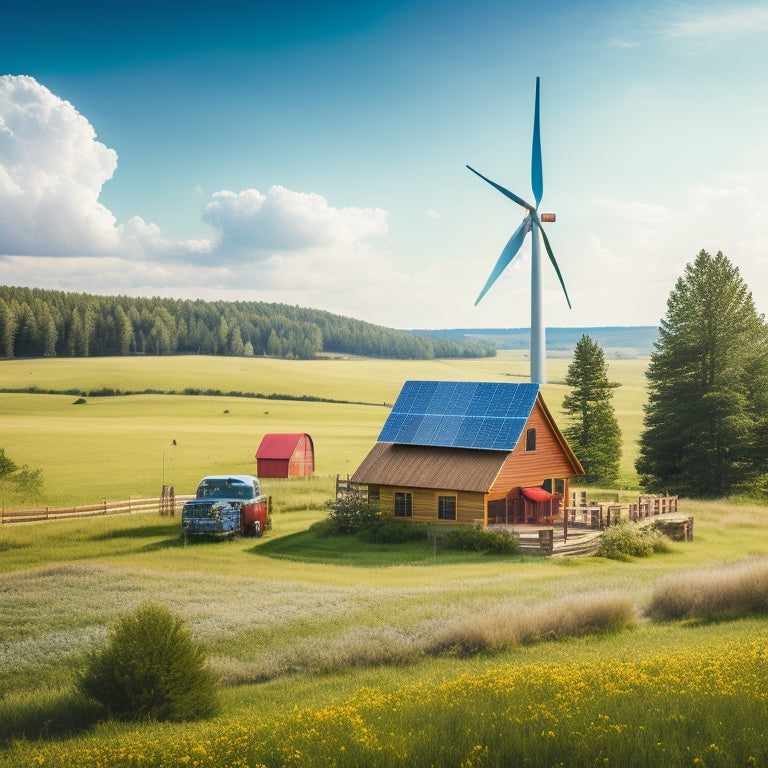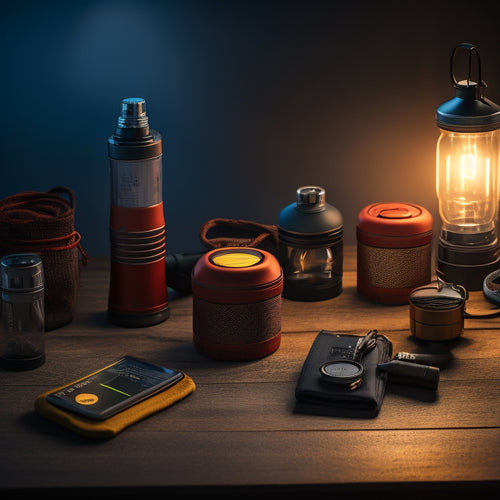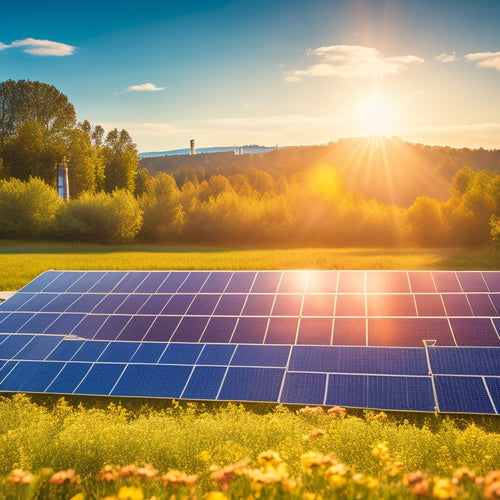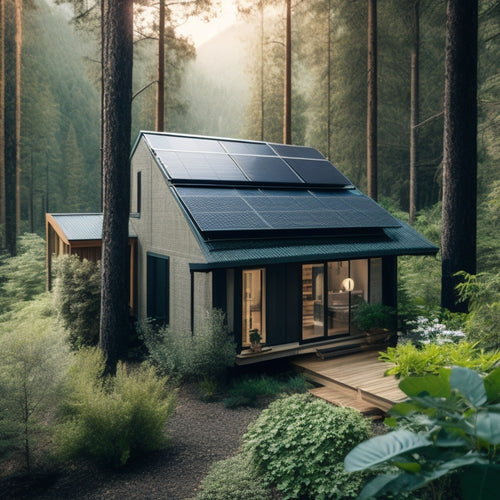
Off-Grid Energy Solutions for Rural Homes
Share
As you explore off-grid energy solutions for your rural home, you're likely driven by the desire for energy independence, reduced carbon footprint, and lower energy costs, making solar power systems an attractive option. Solar power can reduce your reliance on non-renewable energy sources, decrease your carbon footprint, and provide a reliable source of energy. To get started, you'll need to choose the right solar panels, design an off-grid solar system, and select appropriate battery storage and inverters. By considering these factors, you can create an efficient and cost-effective off-grid energy system. What else do you need to know to make the switch?
Key Takeaways
• Consider solar power systems that reduce reliance on non-renewable energy sources and decrease carbon footprint for rural homes.
• Choose the right solar panels by balancing upfront cost with electricity generation potential and considering panel efficiency and durability.
• Design an off-grid solar system that accurately sizes energy needs, ensures proper wire management, and invests in a reliable monitoring system.
• Select an inverter compatible with the required power output, considering factors like inverter sizing, surge protection, and noise levels.
• Ensure proper installation and maintenance by following safety protocols, inspecting for wear and tear, and maintaining detailed records of maintenance history.
Benefits of Solar Power Systems
You can greatly reduce your reliance on non-renewable energy sources by harnessing the power of solar energy, which offers numerous benefits for rural homeowners. By installing a solar power system, you can substantially decrease your carbon footprint and contribute to a cleaner environment.
Solar energy provides energy independence as well, allowing you to generate your own electricity and reduce your reliance on the grid.
Solar power systems also offer a reliable source of energy, even in remote areas where traditional energy infrastructure may be limited. With a solar power system, you can enjoy a consistent supply of electricity, powering your home and essential appliances.
Solar energy is also a free and abundant resource, reducing your energy costs and saving you money in the long run. By adopting solar power, you'll not only reduce your environmental impact but also enjoy the financial benefits of energy independence.
Choosing the Right Solar Panels
When selecting the right solar panels for your off-grid energy solution, you'll want to take into account two key factors: panel efficiency and budget-friendliness.
You'll need to balance the upfront cost of the panels with their potential to generate electricity over time, as more efficient panels often come at a higher price point.
Panel Efficiency Matters
With solar panels being a substantial investment for rural homeowners, selecting panels with high efficiency ratings can greatly impact the overall performance and cost-effectiveness of an off-grid energy system. You'll want to look for panels with high power output per unit area, as this directly affects your energy harvesting capabilities.
A higher efficiency rating means more energy generated per hour of sunlight, resulting in reduced panel requirements and lower installation costs.
When evaluating panel efficiency, you should also consider panel durability. A longer-lasting panel will provide a higher return on investment and reduce maintenance costs over time. Look for panels with a durable design, high-quality materials, and a proven track record of performance in various environmental conditions.
By choosing panels with high efficiency and durability, you'll be able to maximize your energy harvesting capabilities, reduce your energy costs, and enjoy a more reliable off-grid energy system.
Budget-Friendly Options
For rural homeowners on a budget, finding affordable solar panels that meet performance and durability standards is crucial to achieving energy independence without breaking the bank. You don't have to sacrifice quality for cost, and there are several options to contemplate.
When shopping for budget-friendly solar panels, keep the following factors in mind:
-
Energy Audits: Conduct an energy audit to determine your energy needs and identify areas for improvement. This will help you choose the right solar panel system for your rural home.
-
DIY Installations: Contemplate DIY installations to save on labor costs. However, make sure you have the necessary skills and follow safety guidelines.
-
Entry-Level Panels: Look for entry-level solar panels that offer decent efficiency at a lower price point.
- Certified Refurbished Panels: Explore certified refurbished solar panels that have been inspected and certified by the manufacturer or a third-party organization.
Off-Grid Solar System Design
You'll need to carefully consider several key factors when designing an off-grid solar system, including the size and type of solar panels, the capacity and type of battery bank, and the efficiency of the charge controller and inverter.
A thorough site assessment is important to determine the best system design, taking into account factors like shading, roof orientation, and local building codes.
Accurate system sizing is critical to make sure you're generating enough power to meet your energy needs. Proper wire management is also necessary to minimize energy losses and ensure safe operation.
A well-designed grounding system is crucial to protect your system from electrical faults and lightning strikes. To make sure of top performance, you'll need to invest in a reliable system monitoring system.
Load calculation is another critical step, as it helps you determine the total power requirements of your rural home. Finally, it's important to adhere to local electrical codes and regulations to make sure your system is safe and compliant.
Battery Storage for Rural Homes
As you consider off-grid energy solutions for your rural home, you'll want to explore battery storage options that meet your specific needs.
You'll need to choose between lead-acid, lithium-ion, and other energy storage options, considering factors like cost, capacity, and lifespan.
Energy Storage Options
Rural homeowners seeking to harness renewable energy sources often rely on battery storage to stabilize their off-grid systems, guaranteeing a reliable supply of electricity when the sun isn't shining or the wind isn't blowing.
As you explore energy storage options, it's crucial to take into account the type of batteries that best suit your needs. Here are some key considerations:
-
Flow Batteries: These batteries store energy in a liquid electrolyte solution in external tanks, allowing for flexible and scalable energy storage. They're ideal for long-duration energy storage and can provide backup power for several days.
-
High Energy Densities: Look for batteries with high energy densities, which enable more efficient energy storage in a smaller footprint. This is particularly important for rural homes where space may be limited.
-
Depth of Discharge (DOD): Consider batteries with a high DOD, which allows you to use more of the battery's capacity without reducing its lifespan.
- Cycle Life: Opt for batteries with a high cycle life, which ensures they can withstand repeated charging and discharging without degrading.
Battery Maintenance Tips
Proper maintenance is key to guaranteeing your battery bank operates efficiently and extends its lifespan, as such, it's essential to establish a regular maintenance routine. You should check your battery bank's state of charge, voltage, and temperature regularly to identify any potential issues early on.
Deep cycling, which involves regularly discharging your batteries to 50% or lower, helps to maintain their health and prevent sulfation. It's also vital to monitor cell balance, as uneven charging can reduce your battery bank's overall capacity.
You can use a battery management system (BMS) to monitor and control your batteries' state of charge, voltage, and temperature. Additionally, keep your batteries in a well-ventilated area, away from extreme temperatures and physical damage.
Off-Grid Power Systems
You'll need to evaluate several key components when designing an off-grid power system that effectively integrates battery storage for your rural home. This thorough approach guarantees a reliable and efficient energy supply, even when the grid is unavailable.
To achieve grid resilience, consider the following essential factors:
-
System monitoring: Implement a monitoring system to track your energy generation, consumption, and storage levels in real-time. This data helps you optimize your system's performance and identify potential issues before they become major problems.
-
Battery selection: Choose deep-cycle batteries designed for off-grid systems, considering factors like capacity, depth of discharge, and charging/discharging rates.
-
Charge controller configuration: Ensure your charge controller is compatible with your renewable energy source (e.g., solar or wind) and battery bank, and that it can handle the maximum power output.
- Inverter selection: Select an inverter that can handle the required power output and is compatible with your battery bank and electrical load.
Inverters for Off-Grid Systems
When designing an off-grid energy system, selecting the right inverter is crucial, as it converts DC power from your renewable energy source into usable AC power for your home. The inverter's primary function is to convert DC power into AC power that can be utilized by your appliances.
| Inverter Type | Description |
| Grid Tie | Converts DC power to AC power and feeds excess energy back to the grid |
| Off-Grid | Converts DC power to AC power for off-grid systems |
| Hybrid | Combines grid-tie and off-grid capabilities |
| Micro | Small, modular inverters for small-scale systems |
| Central | Large, high-power inverters for commercial-scale systems |
When choosing an inverter, take into account factors such as inverter sizing, surge protection, and system monitoring capabilities. You'll also want to think about the type of inverter that suits your needs, whether it's a grid-tie, off-grid, hybrid, micro, or central inverter. Additionally, consider inverter noise levels and remote access capabilities for monitoring and control. By selecting the right inverter, you'll ensure a reliable and efficient off-grid energy system.
Installation and Maintenance Tips
Your off-grid energy system's performance and longevity rely heavily on a well-executed installation and regular maintenance, so it's essential to get it right from the start. A well-planned installation ensures that your system operates efficiently, safely, and reliably. When it comes to maintenance, regular checks and repairs can prevent minor issues from becoming major problems.
Here are some essential installation and maintenance tips to keep in mind:
-
Grounding systems: Make sure that your system is properly grounded to prevent electrical shocks and fires. Hire a professional to inspect and test your grounding systems regularly.
-
Safety protocols: Develop and follow strict safety protocols when working with electrical systems, including wearing protective gear and de-energizing the system before maintenance.
-
Regular inspections: Routinely inspect your system for signs of wear and tear, corrosion, or damage. Address any issues promptly to prevent system failures.
- Record keeping: Maintain a detailed record of your system's maintenance history, including repairs, updates, and inspections. This helps you track your system's performance and identify potential issues early on.
Frequently Asked Questions
Can I Use a Generator as a Backup Power Source?
You can use a generator as a backup power source, but consider noise reduction features and fuel efficiency ratings to minimize disruptions and environmental impact, ensuring a reliable and sustainable backup solution.
Do I Need a Separate Electrical Panel for Off-Grid Systems?
When designing an off-grid system, you'll need a separate electrical panel to guarantee efficient energy distribution; consider panel sizing and load prioritization to allocate power effectively, making sure critical loads remain operational during outages.
How Often Should I Clean My Solar Panels?
You'll want to clean your solar panels regularly, as dust accumulation directly impacts panel efficiency, reducing energy output. Clean them every 6-12 months, or more often in dry, dusty areas, to maintain peak performance.
Can I Add More Solar Panels to My Existing System?
You can add more solar panels to your existing system, but make sure compatibility and assess your current infrastructure's capacity for system expansion and energy upgrades to maximize efficiency and optimize performance.
Are Off-Grid Energy Systems Eligible for Government Incentives?
'A million reasons to go off-grid, and you're wondering if the government is on board? Yes, you're eligible for tax credits and renewable grants, which can greatly offset your system's cost, making the switch even sweeter!'
Related Posts
-

Best Solar Powered Flashlights for Emergency Situations
When you're choosing the best solar-powered flashlights for emergency situations, focus on their brightness, battery ...
-

Advantages of Solar Generating Systems Over Traditional Energy
Solar generating systems provide several key advantages over traditional energy sources. You'll experience lower long...
-

Off Grid Solar Batteries
As you shift to off-grid living, you'll rely on high-performance solar batteries to store excess energy generated by ...


